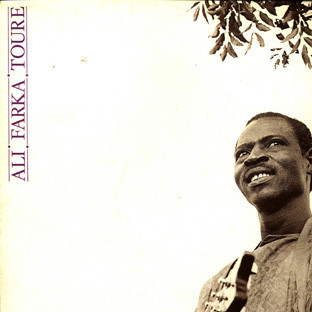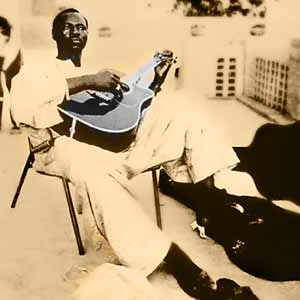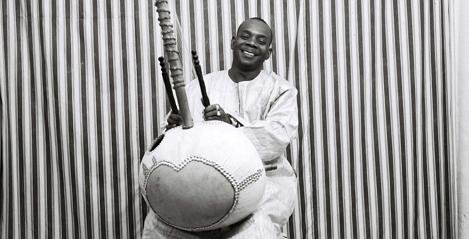
Ali Farka Touré
Ali Farka Touré
Album UK 1987 on World Circuit label
Blues, Folk, World and (Folk, African)
Ali Farka sings in the languages of the peoples of Mali. TIMBARMA. Once there was a woman called Timbarma who was pregnant. She wanted to have a piece of patterned cloth of green, orange, red and yellow. This cloth is worn by many women in Mali and not to have it is a sign that you are not valuable. The woman's husband was poor and could not afford to buy the cloth and when the baby was born the pattern appeared on its arm. The husband was very upset- he ought to have borrowed money in order to buy the cloth. A husband must take great care of his wife when she is pregnant and give her anything she asks. TIMBARMA is sung in Maur and is a traditional song throughout the Timbukto(sic.) and western Mauritanian region SINGYA means mother's milk. If you share the same milk you must never betray one another. Brother must love brother. It's a piece of Advise Ali Farka gives to prevent incidents. 'Hand in Hand, one heart, one faith.' SINGYA is a Malinke song. The tune was composed by Sira Mory Diabate. NAWIYE is a very old traditional praise song of Timbuktoo. Sung to noble hosts at baptisms and social events. 'You cannot be a real noble if you are a liar or if you are treacherous. To be a good noble you must be sincere. He who has nothing can be nothing and do nothing and cannot invite us.' Sung in Songhai. BAKOYTEREYE. Drugs do not fill your stomach or quench your thirst. So why take them and destroy your life. BAKOYTEREYE is sung in Songhai. KADI KADI. Kadi was a girl for whom Ali Farka hap deep affection. During a concert in 1974 she gave him a gold chain. The next day he went to find out her name and her family. He thanked her for the gift and tried to return it but she would not take it back. He went home, took up his guitar and composed this song. Kadi was touched to hear it. 'If you (Kadi) go to Paris they say to you "Bonjour'; if you go to Abidjan they say 'Bonne arrivee' and all because you are beautiful and good. KADI KADI is sung in Bambara. Yulli is a song about camels. The camel has all the attributes that make for a beautiful woman or a handsome man. It has a long neck, big eyes and is tall. It even has nice feet. But still the camel is ugly. Even its shadow is ugly. However the camel is the toughest animal in all the world because it is blessed by the Prophet. So you have to accept it wholeheartedly. YULLI is sung in Fula and was composed by Ali Farka in 1963. BAKOYE. If you feel love for someone you have to show it. Even if your friends and family disapprove, if you have love in you, you must let it out. BAKOYE is adapted from an Arabic praise song and is sung in Songhai. AMANDRAI-My little sister. A love song. If I want to see my friend I can't enter her house. I play or sing something and she will know I'm there. She finds a way to meet me. I sing songs to flatter her and express the love between us. The I must return home(the distance between Tamashek villages is great) in order to wake early for work. All day I think of the girl. AMANDRAI is sung in Tamashek. Ali Farka composed the words and the music is typically Tamashek. Recorded at the Fire House studio, London on October, 1987 by David Stevens. Mixed by Zuni, assit.: Mike Campbell. Bakoytereye & Bakoye recorded at Capital Radio Studios, London on September 13, 1987 by Phillippe Bertrand. Amandrai recorded during performance for Crossing The Border Festival at the Town and Country Club, London on October 5 1987 by John Hadden. Produced by World Circuit, Nick Gold Post production: John Hadden- Direct metal mastered from digital tapes. Design & Artwork: Michel Koven. Photos: Front- Dave Peabody, Back- Jak Kilby. Thanks to Ian Anderson, Toumani, David Jones, Andy Kershaw, & to Arts Worldwide. ©World Circuit 1987 Made in England Distributed by The Cartel via Revolver
Musicians
 | Ali Farka Touré voc, g, 1939-2006 ML vocals, guitar, bongos, kora, calabash, written by, album by |
 | Toumani Diabaté voc, *1965 ML kora, calabash |
Producers
| Zuni mixed by |
| Nick Gold producer |
| David Stevens recorded by |
| John Hadden recorded by |
| Philippe Bertrand recorded by |
Composers
| Ali Farka Touré |
| Traditional |
Album Tracks 

| No | Title | Artist | Composer | Duration | |
|---|---|---|---|---|---|
| 1 | Timbarma | Ali Farka Touré | Ali Farka Touré | 5:05 | |
| 2 | Singya | Ali Farka Touré | Ali Farka Touré | 5:23 | |
| 3 | Nawiye | Ali Farka Touré | Traditional | 5:38 | |
| 4 | Bakoytereye | Ali Farka Touré | Ali Farka Touré | 5:00 | |
| 5 | Kadi Kadi | Ali Farka Touré | Ali Farka Touré | 5:23 | |
| 6 | Yulli | Ali Farka Touré | Ali Farka Touré | 5:17 | |
| 7 | Bakoye | Ali Farka Touré | Ali Farka Touré | 4:06 | |
| 8 | Amandrai | Ali Farka Touré | Ali Farka Touré | 9:40 |
30sec audio samples provided by ![]()
ArtistInfo App
ArtistInfo for iOS and ArtistInfo for Mac are presenting musicians, composers and producers that are envolved in the musical work that you are listening to in Apple Music, iTunes, or Spotify. Discover new music via the network among artists. Manage your favorite musicians and albums via iCloud and share recommendations with your friends via email, AirDrop, or Social Media.Acknowledgements
To all the music fans that are contributing on Discogs, MusicBrainz and Wikipedia. Thanks to Franz Flückiger for providing Storygram used to visualize band membership.Other Search Results
| Ali Farka Touré - Ali Farka Touré FR 1984 Blues, Folk, World and |
| Ali Farka Touré - Ali Farka Touré FR 1976 World |
| Ali Farka Touré - Ali Farka Touré FR 1976 World |
| Ali Farka Touré - Ali Farka Touré FR 1977 Blues, Folk, World and |